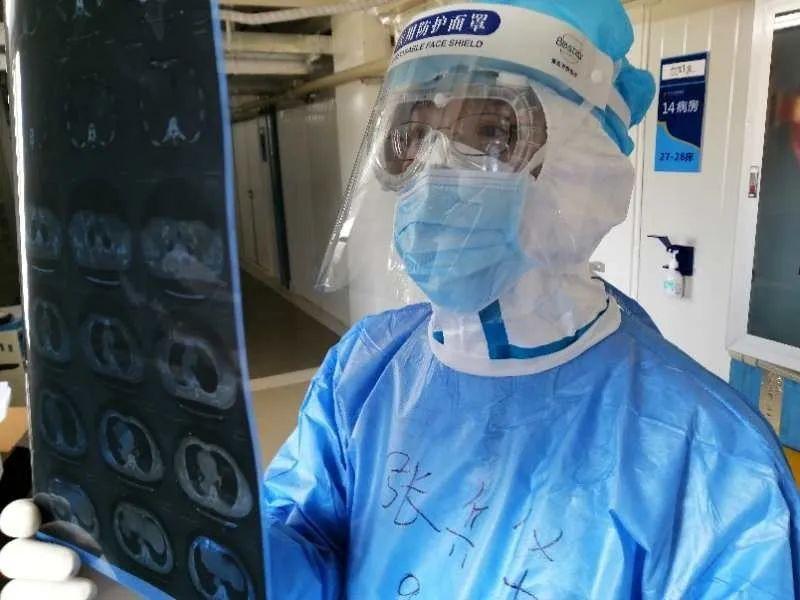

Every feeling of terror and mental anguish and anxiety goes through the mind of each man there, and is put down by resolve.
——John Masefield, Gallipoli

Zhang Binghua, a pulmonologist at a military hospital, is currently treating COVID-19 patients at the Division of Infectious Diseases at Huoshenshan Hospital. (Photo/81.cn)
This year’s Spring Festival was a special one for Zhang Binghua, a pulmonologist at a military hospital. At 2:40 a.m. on New Year's eve, he was woken by an unexpected phone call.
“You have been selected to join the medical team to aid Wuhan.”
Later that night, Zhang arrived at Wuhan airport. In the days that followed, he and his comrades threw themselves into the battle against COVID-19, a disease that has engulfed the country and the world.
Zhang is currently treating COVID-19 patients at the Division of Infectious Diseases at Huoshenshan Hospital, one of the two temporary hospitals built in days to fight the coronavirus in Wuhan, Central China’s Hubei province.
A soldier’s mission

Zhang Binghua takes a round of inspections. (Photo/81.cn)
In Huoshenshan Hospital, every ward inspection is a battle. A round of inspections can easily take over 4 hours for Zhang to complete. In order to assess each case more accurately, Zhang often stands by patients’ bedsides and monitors them closely for extended periods until he comes up with a proper treatment plan for each.
As thick protective suits prevent the use of stethoscopes in isolation wards, he has to check each patient’s condition by feeling their pulse directly on the wrist. As some elderly patients are hard of hearing, Zhang has to get close to them to talk into their ears, which increases the risk of infection. Despite all these hazards, Zhang is not afraid. “Being closer to patients increases their trust in us doctors,” he said.
Through Zhang’s tireless round-the-clock efforts, each patient’s appearance and CT scans have been burned into his memory -- simply by looking at a CT scan, he can quickly tell who the patient is and which bed he’s in.
Every step forward taken by a medical worker causes the virus to take a step back. Zhang and his colleagues have made great efforts to produce personalized treatment plans and cured a number of severely ill patients.
To everyone’s delight, none of Zhang’s team members has been infected by the virus.
The words that Zhang and his colleagues often hear from patients is, "Thank you, PLA soldiers.”
“Soldiers must live up to the trust of people,” he said.
Healing with empathy

Zhang Binghua looks at a CT scan. (Photo/81.cn)
As the lethal virus sweeps the country, it’s an extremely difficult time not only for medical workers, but also for patients, with many fearing that their lives are about to end. Because of this, Zhang strongly believes that in addition to medical treatment, providing humanistic care for these patients is also crucial.
To calm anxious patients and build their confidence in winning the battle against the coronavirus, he often shows them their CT scans and analyzes how their condition is improving. “We need to treat them with empathy and love,” he noted.
When Zhang recently learnt that an elderly patient was experiencing low spirits and suffering from loss of appetite, he bought her some fruits and chatted with her. The patient gradually calmed down and told him, “Thank you, doctor, for helping me build up my confidence. I will cooperate with your treatment.”
Zhang firmly believes that patients will remember doctors who treat them with care and love.
“I’m proud to be trusted by patients,” he said. “And love can be passed on.”

 Award-winning photos show poverty reduction achievements in NE China's Jilin province
Award-winning photos show poverty reduction achievements in NE China's Jilin province People dance to greet advent of New Year in Ameiqituo Town, Guizhou
People dance to greet advent of New Year in Ameiqituo Town, Guizhou Fire brigade in Shanghai holds group wedding
Fire brigade in Shanghai holds group wedding Tourists enjoy ice sculptures in Datan Town, north China
Tourists enjoy ice sculptures in Datan Town, north China Sunset scenery of Dayan Pagoda in Xi'an
Sunset scenery of Dayan Pagoda in Xi'an Tourists have fun at scenic spot in Nanlong Town, NW China
Tourists have fun at scenic spot in Nanlong Town, NW China Harbin attracts tourists by making best use of ice in winter
Harbin attracts tourists by making best use of ice in winter In pics: FIS Alpine Ski Women's World Cup Slalom
In pics: FIS Alpine Ski Women's World Cup Slalom Black-necked cranes rest at reservoir in Lhunzhub County, Lhasa
Black-necked cranes rest at reservoir in Lhunzhub County, Lhasa China's FAST telescope will be available to foreign scientists in April
China's FAST telescope will be available to foreign scientists in April